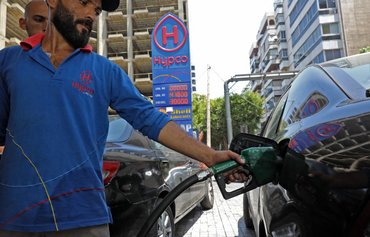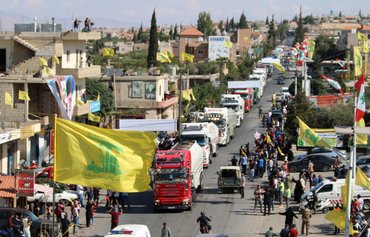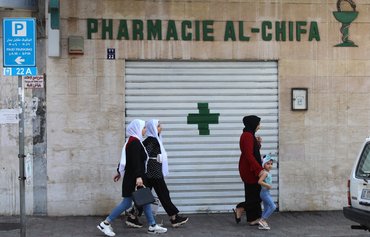BEIRUT -- Hizbullah chief Hassan Nasrallah's Sunday (August 22) proclamation that the first of several vessels carrying Iranian oil is on its way to Lebanon has been sharply criticised by Lebanese politicians and activists.
Nasrallah is attempting to paint himself as a "saviour" amid Lebanon's energy crisis, they said, but the consequences of the sanctions-defying move could cost Lebanon much more than any temporary advantage it might gain.
Announcing the move in a speech last Thursday, Nasrallah threatened those who might seek to intercept the shipments, stating that as soon as each vessel leaves Iran, "we will deem that it has entered Lebanese territory".
His announcement evoked a furious reaction from Lebanese politicians, including former prime minister Saad al-Hariri.
![Vehicles queue for fuel at a petrol station in Beirut, Lebanon, on June 11, amid severe fuel shortages. [Anwar Amro/AFP]](/cnmi_am/images/2021/08/24/31333-lebanon-gas-crisis-600_384.jpg)
Vehicles queue for fuel at a petrol station in Beirut, Lebanon, on June 11, amid severe fuel shortages. [Anwar Amro/AFP]
Nasrallah's statement that Iranian ships will be considered Lebanese territory "is the height of compromising our national sovereignty, and a rejected call to treat Lebanon as if it were an Iranian province", al-Hariri said.
"Is the arrival of Iranian ships good news for the Lebanese or a dangerous announcement that would plunge Lebanon into internal and external conflicts?" he asked, pointing to the well-known consequences of doing business with Iran.
They include the risk of additional sanctions for the Lebanese.
Concern over imports
In an open message to Lebanese President Michel Aoun, Samir Geagea, who heads the Lebanese Forces political party, said he held Aoun fully responsible for what might happen to Lebanon if it imports Iranian fuel.
If Aoun does not stop the import of oil and other items from Iran, Geagea said, he will be "exposing Lebanon to the risk of a real catastrophe".
In an interview last Thursday with Al-Arabiya TV, US ambassador to Lebanon Dorothy Shea said that Lebanon "does not need Iran's oil".
There have been talks on possible World Bank financing for a plan to provide Egyptian natural gas to Lebanon via Jordan as part of a larger effort to solve the current crisis and to repair Lebanon's natural gas and electricity infrastructure, she said.
After meeting Aoun on August 16, Shea said the United States welcomes the new European Union sanctions to promote accountability and reform in Lebanon and will "continue to co-ordinate with our partners on appropriate measures".
Importing oil from Iran in this manner -- for a certain segment of the population, against the will of the state -- goes against the interest of Lebanon, said economist Antoine Farah.
By importing Iranian oil, Hizbullah "is defying US sanctions", political writer Roula Mwaffaq said, noting that Nasrallah "is declaring war on the United States and defying the international community, while the Lebanese state is unable to stop him".
Nasrallah already has exhausted Lebanon's financial and economic resources for the benefit of the regime of Syrian President Bashar al-Assad, she added.
Additional sanctions
The import of fuel from Iran without obtaining a special exemption from the US Treasury "could put the country at risk of US sanctions", said Justicia Foundation for Development and Human Rights director Paul Morcos.
For this reason, he said, international financial institutions and banks would be well advised to avoid co-operation with Hizbullah.
He noted that US sanctions dating from August 2018 target "anyone who knowingly enters into deals with Iranian oil companies in order to buy, possess, sell, transfer or market petroleum or petroleum products from the Iranian authorities to include aircraft gasoline, motor gasoline and distilled fuel oil".
The import of Iranian oil by Lebanon "is prohibited under the US sanctions and related laws", he said.
Despite Lebanon's critical need for oil, "there are risks that may accompany this process, especially for companies that not only import oil, but also unload and distribute the cargo of oil coming from Iran", he added.
Activist Hussein Ataya of the Southerners for Freedom movement said that for the past six months, Nasrallah has made a point of advertising his intention to import oil derivatives from Iran with the Lebanese pound.
Nasrallah has promised Hizbullah members and supporters they will be looked after, he said, but this is clearly not the case, as they are in the same boat as all Lebanese, who suffer from the economic crisis and from lack of fuel.

![A Lebanese woman uses light from a candle to put away clothes in Beirut on July 10, amid severe power outages in the crisis-hit country. [Anwar Amro/AFP]](/cnmi_am/images/2021/08/24/31338-lebanon-electricity-600_384.jpg)






